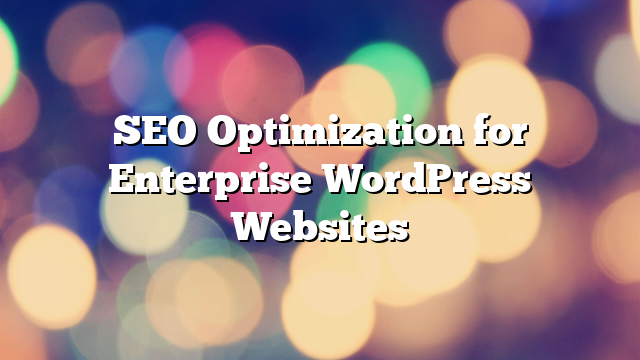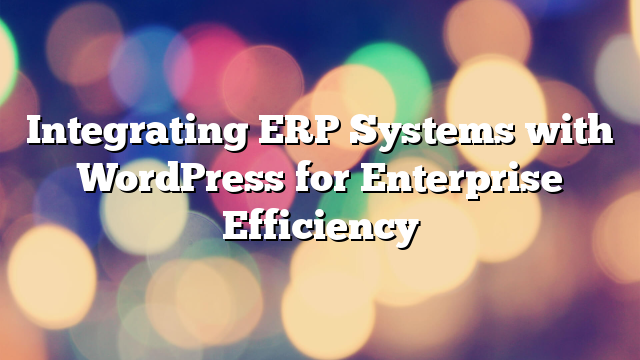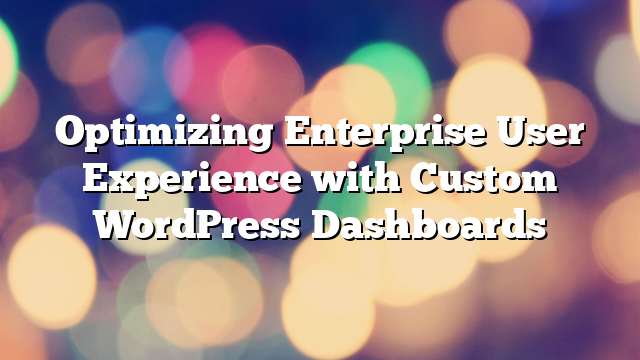SEO Optimization for Enterprise WordPress Websites
12.10.2024

Search engine optimization (SEO) is essential for any website, but when it comes to enterprise-level websites, the stakes are even higher. With WordPress being one of the most popular platforms for enterprise content management, optimizing for SEO can significantly impact search rankings, user engagement, and overall business success. In this article, we explore the best practices for optimizing enterprise WordPress websites for SEO.
Why SEO Matters for Enterprise Websites
Enterprise websites are typically larger and more complex than their smaller counterparts. They often target multiple audiences, manage vast amounts of content, and require higher levels of performance. Effective SEO ensures that these sites rank highly on search engines, attract organic traffic, and provide a seamless user experience.
Key reasons why SEO is crucial for enterprise websites include:
- Higher Competition: Enterprise websites often operate in competitive industries, making it vital to rank well for targeted keywords.
- Global Reach: Enterprises frequently target international audiences, making SEO practices like hreflang tags and localized content optimization essential.
- Content Management: With a larger content repository, ensuring that all content is properly indexed, structured, and optimized is crucial for search engines to crawl the site effectively.
Best Practices for Enterprise WordPress SEO
1. Utilize an SEO Plugin
WordPress has a wide array of SEO plugins that help enterprises implement on-page SEO techniques efficiently. Popular plugins such as Yoast SEO and RankMath guide users in optimizing metadata, generating sitemaps, and ensuring that every piece of content is search engine-friendly.
These plugins allow you to optimize key areas such as:
- Title Tags: Ensure every page has a unique, descriptive title optimized for targeted keywords.
- Meta Descriptions: Write compelling meta descriptions to improve click-through rates (CTR) on search results pages.
- Canonical URLs: Prevent duplicate content issues by specifying canonical URLs for similar pages.
2. Optimize for Mobile and Speed
In today’s mobile-first world, Google places significant emphasis on mobile-friendliness and site speed when ranking websites. For enterprises, optimizing WordPress for both is essential to ensure higher search visibility and better user experience.
Here’s how to improve your mobile and speed optimizations:
- Mobile-Friendly Design: Ensure your WordPress theme is responsive and provides a smooth user experience across all devices.
- Optimize Images: Use image optimization plugins or tools like Imagify to compress images without losing quality, improving page load speed.
- Use a Content Delivery Network (CDN): A CDN like Cloudflare can distribute your content globally, reducing server load and improving speed.
3. Structured Data and Schema Markup
Structured data, or schema markup, helps search engines better understand the content of your website and display rich snippets in search results. Implementing schema markup can lead to improved visibility and CTR.
Popular schema types for enterprise websites include:
- Breadcrumb Schema: Provides search engines with the page hierarchy and improves navigation for users.
- Product Schema: Displays key product details directly in search results for eCommerce enterprises.
- Article Schema: Improves the visibility of blogs, news articles, and other content pieces in search engine results.
4. Implement a Robust Internal Linking Strategy
Internal linking helps distribute link equity across your site, improves user navigation, and encourages search engines to crawl more pages. For enterprise WordPress websites with large amounts of content, having a structured internal linking strategy is essential.
- Use Relevant Anchor Text: Ensure that your internal links are descriptive and use keywords relevant to the content they point to.
- Link Deep Within the Site: Avoid over-linking to the homepage or top-level pages. Instead, link to specific, relevant pages deep within your site to distribute authority.
5. Technical SEO for WordPress
Technical SEO focuses on ensuring that your website is easy to crawl, index, and navigate. Here are some critical technical SEO factors to consider for enterprise WordPress sites:
- XML Sitemap: Ensure your sitemap is up-to-date and includes all important pages. Submit it to Google Search Console and Bing Webmaster Tools.
- Hreflang Tags: If you operate in multiple languages or regions, use hreflang tags to tell search engines which version of the page to show to users based on their language or location.
- Fix Crawl Errors: Regularly check your site for broken links, 404 errors, and other crawl issues that can harm SEO performance.
Measuring SEO Success
Once you’ve implemented these SEO best practices, it’s essential to monitor your performance to ensure your efforts are paying off. Use tools like Google Analytics and Search Console to track metrics such as:
- Organic Traffic: Monitor changes in organic search traffic over time to see if your optimization strategies are working.
- Keyword Rankings: Track the performance of target keywords and measure improvements in your rankings.
- Backlinks: Building high-quality backlinks from reputable websites can significantly improve your domain authority and rankings.
Conclusion
SEO optimization for enterprise WordPress websites requires a strategic approach that goes beyond the basics. By leveraging tools like SEO plugins, improving site performance, optimizing for mobile, and implementing technical SEO best practices, enterprises can significantly enhance their search rankings and overall online visibility.
For more insights on optimizing your enterprise WordPress site, visit AllWebDev’s contact page to explore our professional SEO services.



